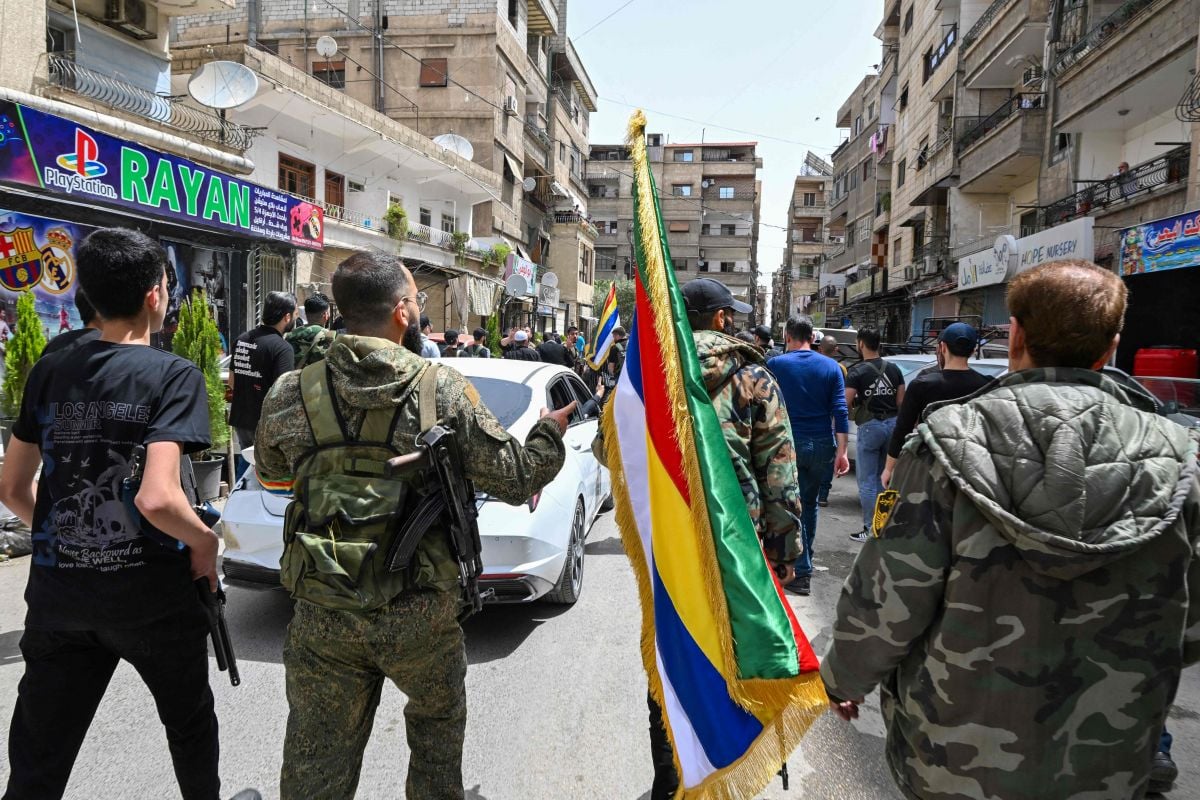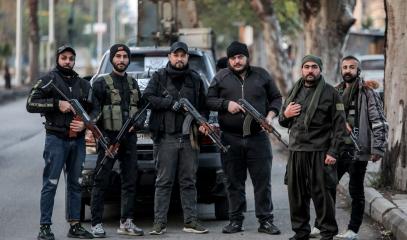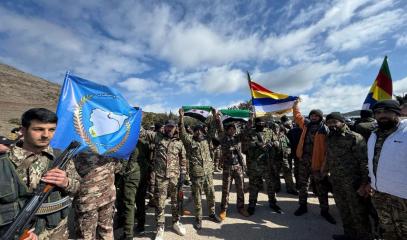After the Alawites, the Druze: Are minorities at risk in al-Sharaa's 'new' Syria?
A hundred people have died in clashes between Druze and Sunni militias near Damascus and Suwayda. The spiritual leader of Syria’s Druze calls for international intervention. In Lebanon, groups hostile to Syria’s Islamist regime hold protest rallies. Jumblatt announces agreement in principle with Damascus. At dawn Israel struck near the Syrian presidential palace as a warning.
Beirut (AsiaNews) – Blaspheme against the Prophet of Islam! This is the spark that set off fierce fighting with light and medium weapons that shook the city of Jaramana (one million residents near Damascus) and Sahnaya, 15 km from the capital, earlier this week (28-30 April), pitting Sunni groups of the new Islamist regime in Damascus against Druze fighters and civilians.
Street fighting left about a hundred people dead, including 30 members of the Syrian security forces.
The violence erupted after an audio message deemed blasphemous against the Prophet Mohammed was attributed to a Druze official and carried on social media. Considered a fake, the message was disavowed by the Druze community.
Still, a fanatical armed group affiliated with the government launched the hostilities, opening fire on Druze guards patrolling Jaramana. Fighting spread after a hasty mobilisation by Druze civilians, some of whom were young people carrying weapons for the first time.
The mayor of the town of Sahnaya and his son are among the victims killed in two or three days of violence. Both were shot dead in cold blood inside their home.
Thanks to intensive contacts in Beirut with Saudi Arabia, Turkey and Qatar, an agreement in principle was reached on Thursday evening between Syrian authorities and Druze leaders in Suwayda and Jaramana.
Walid Jumblatt, leader of the mostly Druze Progressive Socialist Party (PSP), announced the agreement. This party is playing the card of Syrian unity and remains aware that the balance of power on the ground is, in any case, unfavourable to Druze militias.
He also believes that a conflict will certainly lead to an exodus of the population that would play into Israel's hands.
Under the terms of the agreement, in exchange for the deployment of additional units from the Ministry of Defence to sensitive areas, Druze groups would hand over their heavy weapons to the government.
In addition, the deal provides for the restoration of an active presence of the new government in the Suwayda governorate, with the collaboration of local Druze officials, and the reestablishment of security on the strategic road linking the city to Damascus.
A few hours before the agreement was made, Israel launched a "warning strike" on Friday morning near the Syrian presidential palace. On Wednesday, an Israeli drone carried out another warning strike near Damascus, without causing any casualties.
"We will not allow (Syrian) forces to be sent south of Damascus, or threaten the Druze community in any way," said Israeli Prime Minister Benyamin Netanyahu. Meanwhile, Israeli Druze formed a volunteer corps to intervene in the Golan and Suwayda if necessary.
Reactions in Syria and Lebanon
Calm returned but not before Sheikh Hikmat al-Hajari, the spiritual leader of Syria's Druze community, issued a virulent statement on Thursday, denouncing an unjustified “genocidal campaign” targeting “civilians in their homes” and calling for "an immediate intervention by international forces".
Accusing the Syrian government of duplicity, Sheikh el-Hajri said he no longer trusted "an entity pretending to be a government... because the government does not kill its people through its extremist militias... and then claim they were unruly elements after the massacres".
This is the same argument made in connection with the massacres of Alawites in Homs and on the Syrian coast last March. In fact, the Syrian army is far from being unified, observers note.
“The militiamen who made the trip from Chechnya, Turkey, Albania or Europe did not come to build a democratic and free country, but an Islamic state where any version of Islam seen as deviant is rejected,” said Hans-Jakob Schindler, director of the Counter-Extremism Project, quoted by Stephanie Khoury in L'Orient-Le Jour.
Meanwhile, in Beirut, Druze leader Walid Jumblatt has intensified his diplomatic efforts in all directions (Turkey, Saudi Arabia, Qatar) to contain the escalation. In his view, Israel wants “to implement the plan it has always had... which is to break up the region into confessional entities,” a goal certain Israeli ministers have openly espoused.
After protesters blocked the highway to Damascus, Jumblatt urged the angry crowd to let it reopen given its key role for the country’s economy.
Lebanon’s Druze leader faces a challenge in Sheikh Muaffak Tarif, the spiritual leader of Israel’s Druze community, who is a staunch supporter of Israel and is in favour of Israeli territorial encroachments at the expense of Syria and the occupation of the militarily strategic Golan Heights, and their water resources.
Attached to the Arab roots of his community, Jumblatt noted that Israel adopted a law making it “the nation-state of the Jewish people"; for this reason, he fears future action by the Israeli state against his co-religionists.
17/07/2025 18:56
15/09/2021 13:55









.png)










